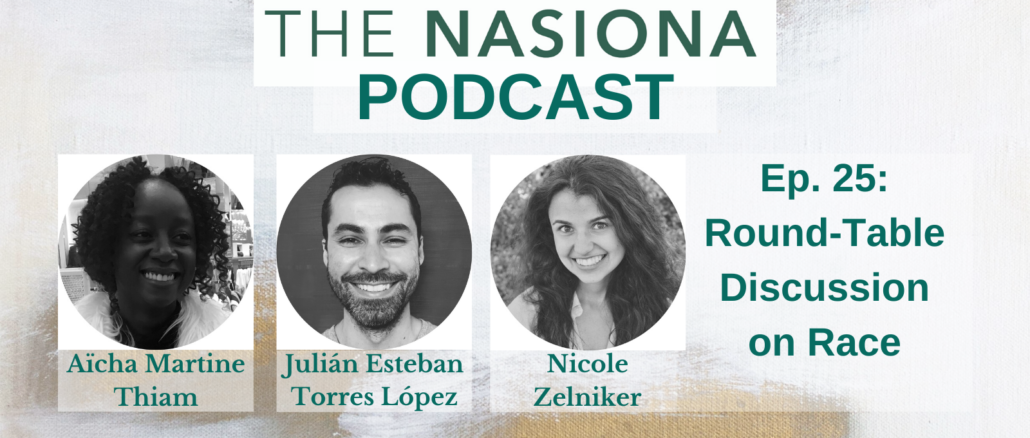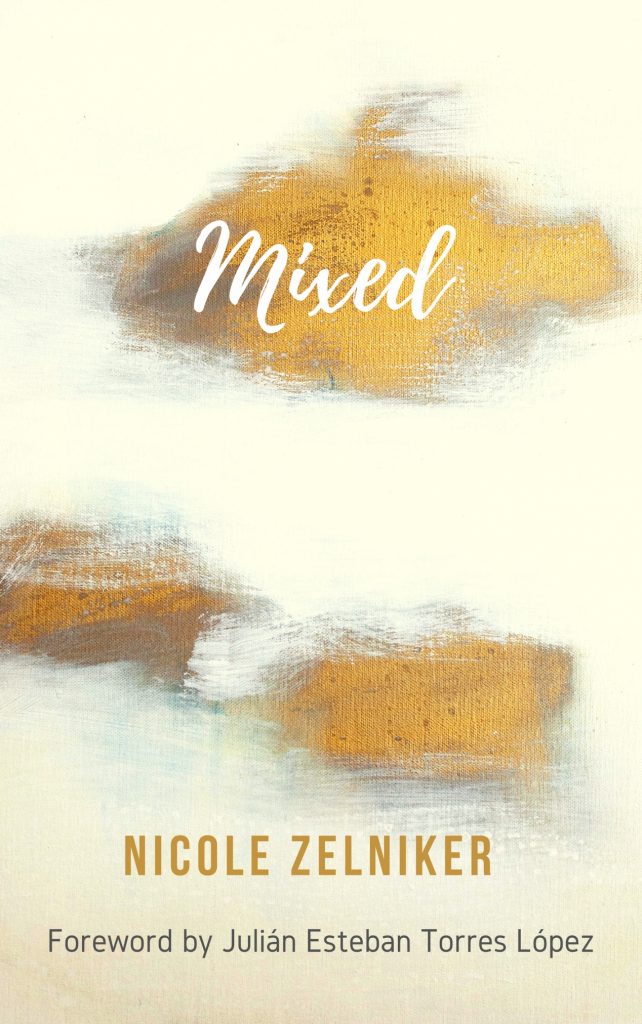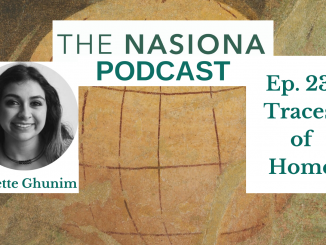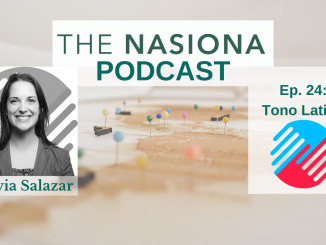
You can also find our podcast episodes on Apple Podcasts, Google Play Music, iHeartRadio, and Stitcher.
Nasiona podcast producers and editors Aïcha Martine Thiam, Nicole Zelniker, and Julián Esteban Torres López explore why it’s so difficult to discuss race, how race differs in different countries, race in publishing, share personal anecdotes, and give our take on Jordan Peele‘s “documentary” Get Out.
Our Being Mixed-Race podcast series is the companion to Nicole’s book, Mixed, published by The Nasiona and available in paperback on Amazon, on Amazon Kindle, and on Barnes and Noble’s website. In both the book and the podcast series, Nicole spoke to dozens of mixed-race families and individuals, as well as experts in the field, about their own experiences, with the hope to fill a gap in the very important conversation about race in the US today. We shared with you discussions regarding relationships, adoption, education, parenting, disability inclusion, activism, intersectionality, family, passing as white, among other topics. Last October, Aïcha, Nicole, and Julián had a post-production conversation about the podcast series: what hit home for us, what we learned, and what surprised us. Today’s episode is that conversation.
Aïcha Martine Thiam is a trilingual writer, musician, and artist who goes where the waves take her, and an Assistant Editor at Reckoning Press. She will quote obscure film facts at you, unprovoked. Her collection of poems, “AT SEA” was shortlisted for the 2019 Kingdoms in the Wild Poetry Prize. Some words found or forthcoming in: Berfrois, The Rumpus, Bright Wall/Dark Room, Metaphorosis, South Broadway Ghost Society, RIC Journal, Lamplight, TERSE. Journal, Gone Lawn, Truancy Mag, Crack the Spine, Confessionalist Zine, Ghost City Review, Rogue Agent, Boston Accent Lit, Déraciné.
Twitter: @Maelllstrom
Julián Esteban Torres López is a Colombian-born journalist, publisher, podcaster, and editor. Before founding the nonfiction storytelling organization The Nasiona, he ran several cultural and arts organizations, edited journals and books, was a social justice and public history researcher, wrote a column for Colombia Reports, taught university courses, and managed a history museum. He’s a Pushcart Prize and Best Small Fictions nominee and has written two books on social justice. Torres López holds a bachelor’s in philosophy and in communication and a master’s in justice studies from University of New Hampshire and was a Ph.D. candidate at University of British Columbia Okanagan, where he focused on political science and Latin American studies.
Twitter: je_torres_lopez
Nicole Zelniker is a graduate of the Columbia Journalism School and an editorial researcher with The Conversation US. Her work has appeared on The Pulitzer Prizes website and in USAToday and Yes! Weekly, among other places. A creative writer as well as a journalist, Nicole has had several pieces of poetry published including “Cracks in the Sidewalk” (Quail Bell Magazine) and “Surge” (The Greenleaf Review), as well as three short stories, “Last Dance” (The Hungry Chimera), “Dress Rehearsal” (littledeathlit), and “Lucky” (Fixional). Zelniker’s book, Mixed, is a work of non-fiction about race and mixed-race families.
The definition of families is widening, whether it’s because of mixed-race relationships, interracial adoption, or numerous other factors. Today, it is important to hear from a growing population about race, their shifting identities, and what family means to them. At the heart of the issue are the mixed-race families. Many mixed-race children have had difficulties fitting in, whether with one race or the other. In mixed-race relationships, one partner may face racism, while the other may not, or else they will experience racism in different ways. Children who have been adopted into families that identify as a race that is not theirs often find that they struggle to fit in with their families as well as with people who identify as their own race. Not only are these families navigating US American culture at large, but they also must navigate their own family structures and what it means to be mixed.
Praise for Mixed
“While race has no biological basis, in the US it is culturally real. Combining personal stories and research, Nicole Zelniker sensitively explores that reality as it relates to identity struggles in a variety of multi-race family structures. Mixed is a valuable resource for biological offspring of biracial couples; for adoptees from racial/ethnic traditions different from their adoptive parents; and for biracial couples, both gay and straight, considering parenthood. Teachers and relatives whose lives these families touch are sure to gain valuable insight as well.”
—Nancy Werking Poling, author of Before It Was Legal: A Black-White Marriage (1945-1987)
“At a time when US society is being ripped asunder by division, we are more inclined than ever to retreat to our tribes, where we believe we are more likely to find safety and understanding. But what happens when you belong to more than one tribe, when your identity doesn’t neatly slide into a particular slot? In Mixed, Nicole Zelniker deftly explores the fascinating conflicts and confusion that often course through the daily lives of people sitting on the bubble between two communities, two different worlds. These are existences that our society desperately needs to understand, to welcome, to celebrate—for this is the American future.”
—Nick Chiles, Pulitzer Prize-winning journalist and New York Times bestselling co-author of The Rejected Stone: Al Sharpton and the Path to American Leadership
“Mixed will be a tremendous resource for those trying to understand why race still matters in the 21st century US. The interviews offer depth and richness in expressing the lived experience of racially mixed families and their children in the age of Trump. Zelniker’s work exposes the myth of colorblindness that many white residents of the US still cling to, but must relinquish when they love someone of color. To love someone is to understand at least something about how they live, and Mixed presents in collage a portrait of mixed-race families and the confusion, frustration, love, and deep communication that exists in real relationships across the color line.”
—Lisa McLeod, Professor of Philosophy and co-lead of the Understanding Racism Workshop at Guilford College
“There is always scope to learn more about what it means to be mixed. This book makes an important contribution to this burgeoning literature, with its insight and portrayals of the many different mixed experiences that have yet to come to light.”
—Miri Song, Professor of Sociology and author of Multiracial Parents: Mixed Families, Generational Change, and the Future of Race
“Through the stories of a deeply diverse array of people, we learn more than we could imagine about what it means to be multiracial. This beautifully-crafted book unites these stories so that we peel them back, layer after layer to find delight, shame, joy, confusion, acceptance, prejudice, pain, optimism, and so many more life experiences. Mixed is a necessary work that adds nuance to the national discourse about race in the United States.”
—Amina Chaudhri, author of Multiracial Identity in Children’s Literature: Reading Diversity in the Classroom
“This book, rich with direct and honest voices speaking across and beyond racial lines, could not be more timely. Drawing on both the historical record and contemporary data, Zelniker straightforwardly frames what it has meant and means to be mixed race in America, while creating a refreshing and necessary space for people and stories that have too often gone unheard in our conversations about culture and individual identity. With a journalist’s sensitivity, she deftly stands back to let her interview subjects speak for themselves. The result is a collection of encounters that is as authentic as it is informative. As a mixed-race American, I deeply appreciated the accuracy and clarity of this book–but most of all the way it listens to the candid and varied and complex voices that lie at its heart. Highly recommended.”
—Mylène Dressler, author of The Last to See Me and Associate Professor of English
The Nasiona Podcast shares stories that explore the spectrum of human experience and glimpse into foreign worlds. We focus on stories based on facts, truth-seeking, human concerns, real events, and real people, with a personal touch. From liminal lives to the marginalized, and everything in between, we believe that the subjective can offer its own reality and reveal truths some facts can’t discover. Hosted, edited, and produced by Julián Esteban Torres López.
Our theme song is “Lat Dior” by Abdoulaye Mboup.






